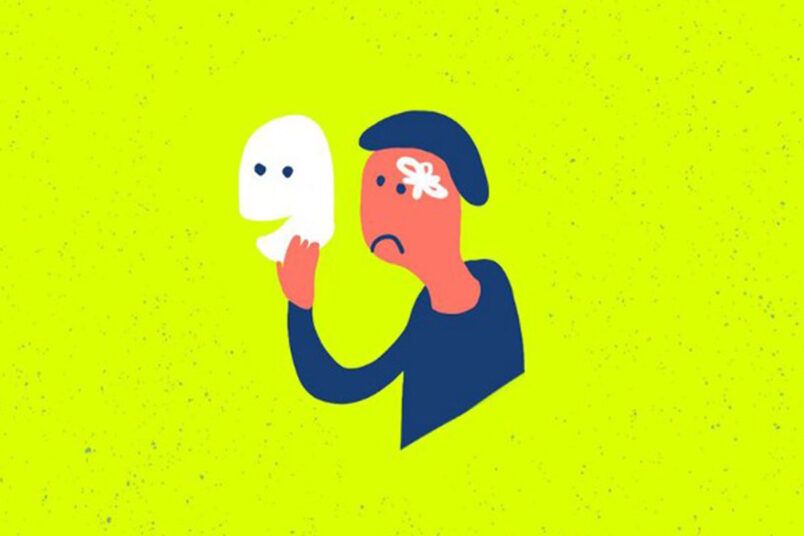
“But you look okay”

Recently, I was supporting a caller who had Chronic Fatigue Syndrome. She had high sensitivity to electric devices and felt exhausted very often. Her daily life had many challenges. She confided that people at her work did not understand what she was going through and then said something really odd:
They were better with support and sympathy when I had eczema because they could see it.
Not taking away from the challenges that eczema brings, in her life it was Chronic Fatigue Syndrome that was more significant, yet the response from people for this was very different.
Another caller reported something similar — several years ago she had brain surgery and people from work came to see her in hospital. More recently, she had to take time off work for her mental health, which had deteriorated in part due to ill health, in part due to stress at work and in part due to Covid. She said she was very ‘aggrieved’ that this time no one from work had checked in on her.
Reflecting on my experience
As often happens, these calls made me reflect on my own experience. I have always seen myself as someone who has cared for the opinion of a select few people, the rest not so much. But perhaps that wasn’t entirely true.
I have had three procedures on the brain, but these were non-invasive surgeries. No one looking at me can tell I have had a life-threatening medical event.
It is easy to assume that I have not changed, but I have — significantly, from my past self.
I can’t bear too much noise, I can’t focus on one thing for too long, I dislike bright lights and it feels like I am always tired. But people can’t see any physical changes and so can’t understand easily.
As I was recovering at home and was in the process of reclaiming my ‘normal’ life back, I also had to face a similar lack of understanding. And this added to my anxiety initially.
After years of dealing with peoples’ different reactions to my own symptoms, I think I know how to deal with things now and here are my takeaways.
Different responses I’ve had to my condition
Over the years I have tended to bucket people in my life in to four categories:
- Those who get it
- Those who don’t
- Those who I want to explain my situation to, and finally…
- …in their very own special category, are children.
The ones who ‘get it’
Often people who have faced a serious health situation themselves or of a loved one, are faster at understanding what you are going through; visible or not. They understand the anxiety and the fatigue and often are the ones you depend on the most. They play a crucial role in ensuring you can vent your frustrations, guide you to come to terms with your condition, and make changes to adapt to a new ‘post diagnosis’ life.
I have been lucky enough to have my close family, many friends and colleagues who are in this category. And so if you are able, speak to those close to you about how you are feeling — I often help people to prepare for and start these conversations with relatives and friends.
On my calls though, I often hear of people who are struggling precisely because they feel no one is able to understand what they are going though.
For people in this position, I would encourage you to seek this understanding from people like me, who provide peer support. We can help you talk through your feelings and struggles.
As one caller I supported who was struggling with anxiety and subsequently temper issues, said:
It’s great to get some assurance that I am not going mad.
The ones who ‘don’t get it’
When people who have a fairly good awareness of my medical issues go on to ask me “But why do you feel so tired?” I almost always feel like my brain is shutting the person out. It really is like a tangible feeling. The same for people who causally say, “You should not stress”. This was while I was recovering from being in the hospital, after being told that I could have died. Some of these people, I have come to a conclusion, I don’t have time or energy for and I have distanced myself from them.
I strongly think that when you are grappling with a health condition, a healthy focus on one’s own self is a crucial part of recovery, even if it means distancing yourself from some people. It doesn’t have to be a permanent thing, when you feel better you can move back to some of these relationships. But when you are starting out, it might be best to keep your energy and focus on yourself as much as possible.
The ones you need to explain things to
In some situations you cannot distance yourself from some people easily, for example people at work. Some colleagues, when I returned to office, were very understanding and made many allowances for me to get back on my feet and I count myself as very lucky indeed. Some, however, did not. It almost felt as if, because I could turn up and be available, nothing needed to change.
Since obviously, I looked the same, I must be the same. One of the things that helped was to have honest conversations. I shared a bit of what I had gone through (most colleagues won’t google your condition and so won’t know what you have gone through — I was surprised by this I explained and shared and perhaps made myself more vulnerable in a way, but I reached a better understanding with those people.
Another thing that is necessary is being firm and unapologetic about your needs. Once you make changes in your life, for example taking more rests during the day, sometimes you can find people viewing this almost as a bonus that they can be envious of. In such situations I think reminding people of why you need to do things differently is essential. In my previous job I used to work short days at the start of my return to work and was leaving at 3:00pm on a particular day; a colleague commented how lucky I was to leave early. A random, passing remark — no doubt because I looked well and was going to drive back home. So very normal. I was shocked and frankly very annoyed. I responded, “If you and I pray hard enough, you may get lucky and get a bleed on your brain as well, then you can leave at 3:00pm too and earn less as well”.
I don’t think the colleague was trying to be mean but sometimes I think it is best to remind people that the allowances you have are not what you wished for, but what are necessary for you to function.
Children
“Mummy is always tired” is something I have heard endlessly from my children. On days when I feel a crashing sense of fatigue and refuse conversations and avoid hugs, to hide in my room, I often hear my kids complain. They are young and want me to be present and I cannot always do so. To them too, I look fine. Sharing health news with kids is difficult in any case and becomes more so as you struggle to find the balance between getting them to understand your condition and so some of your behaviours, while ensuring they do not becoming alarmed about your health.
My own way was to share the miracle of science and how doctors can understand the human body and indeed fix it — but they too can’t do so fully and so sometimes people, like me, have to live lives differently. I must confess however, on many days when I am not feeling too patient, a stern look works just as well actually and I use it often.
Choosing how you respond
There is no right or wrong way to handle adjusting to your new life living with a long-term condition, especially if the effects of it are not visible. You can only do what feels right for you at the time.
For me a large part of recovery was getting used to and knowing how to deal with new things — be it physical challenges like fatigue, or the sense of feeling let down by people who I felt did not attempt to understand my changed circumstances. Being prepared for the different responses people may have, and how you can manage these, can help.
There is a lot of help available for people grappling with such issues, both for the person those around them like this recent blog from Headway.